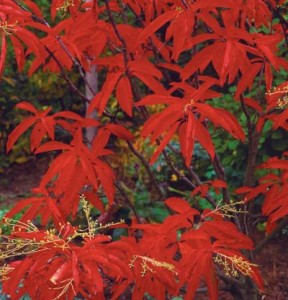Oxydendrum arboreum, Sourwood or sorrel tree, /ˌɒksɨˈdɛndrəm ɑrˈbɔəriəm/ is the sole species in the genus Oxydendrum, in the family Ericaceae. It is native to eastern North America, from southern Pennsylvania south to northwest Florida and west to southern Illinois; it is most common in the lower chain of the Appalachian Mountains. The tree is frequently seen as a component of oak-heath forests.
Contents
Uses
The sourwood is perfectly hardy in the north and a worthy ornamental tree in lawns and parks. Its late bloom makes it desirable, and its autumnal coloring is particularly beautiful and brilliant. The leaves are heavily charged with acid, and to some extent have the poise of those of the peach. The leaves are also a laxative.
It is renowned for nectar, and for the honey which is produced from it. Juice from its blooms is used to make sourwood jelly. The shoots were used by the Cherokee and the Catawba to make arrowshafts.
Benefits
The leaves are cardiac, diuretic, refrigerant and tonic. A tea made from the leaves has been used in the treatment of asthma, diarrhoea, indigestion and to check excessive menstrual bleeding. It is diuretic and is a folk remedy for treating fevers, kidney and bladder ailments. The bark has been chewed in the treatment of mouth ulcers.
Cautions
None known.
Interactions
We currently have no information for Interactions of Oxydendrum arboretum.
Other names
Sorrel Tree
References
Source: Wikipedia, https://en.wikipedia.org/wiki/Oxydendrum
NaturalMedicinalHerbs, http://www.naturalmedicinalherbs.net/herbs/o/oxydendrum-arboreum=sorrel-tree.php

